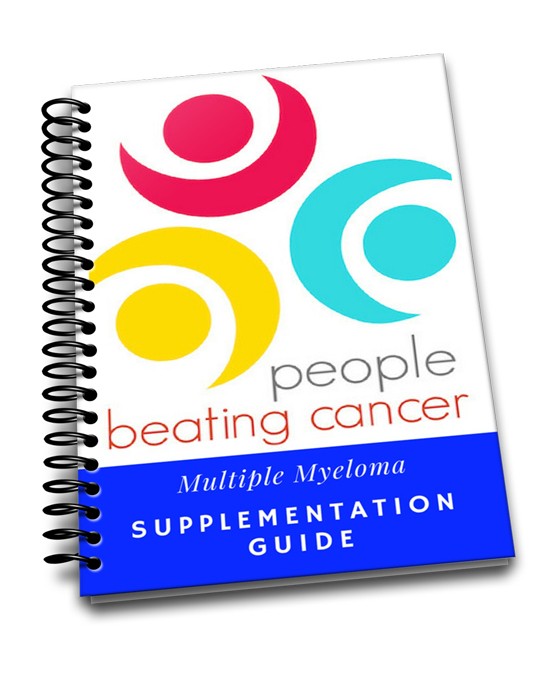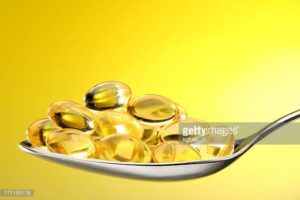
Recently Diagnosed or Relapsed? Stop Looking For a Miracle Cure, and Use Evidence-Based Therapies To Enhance Your Treatment and Prolong Your Remission
Multiple Myeloma an incurable disease, but I have spent the last 25 years in remission using a blend of conventional oncology and evidence-based nutrition, supplementation, and lifestyle therapies from peer-reviewed studies that your oncologist probably hasn't told you about.
Click the orange button to the right to learn more about what you can start doing today.
- You are here:
- Home »
- Blog »
- Healthy Living Products »
- Multiple Myeloma Survivor- Prevent Depression, Prevent Relapse
Multiple Myeloma Survivor- Prevent Depression, Prevent Relapse

Research Cites both Curcumin and Omega-3 Fatty Acids as effective in patients with diagnosis of MDD and on depressive patients without diagnosis of MDD”
For a long time I was a multiple myeloma survivor who was angry at conventional oncology. I was angry because oncologists prescribe toxic drugs that cause side-effects, work only some of the time and are expensive while ignoring the health benefits of curcumin and omega-3 fatty acids.
Virtually every therapy for every malady comes with a long list of short, long-term and late stage side effects. If you doubt what I’m saying, simply listen carefully to the next T.V. commercial touting some drug. Listen carefully to the announcer explaining that death may even occur.
According to the research linked below, not only do curcumin and omega-3 fatty acids prevent depression but they also offer a host of medical benefits as well.
But like many cancers in many stages, curcumin and Omega 3 fatty acids can yield a significant benefit to the patient at minimal financial cost. Evidence-based research has shown that many conventional chemotherapies integrate with aka work better with curcumin and Omega 3 fatty acids
while these two natural therapies reduce the toxicities of certain chemos.
I take Life Extension Super Bio- Curcumin and Life Extension Super Omega 3 fatty acids every morning. Living with multiple myeloma is depressing. Taking chemotherapy is depressing.
I’ve always wondered why I never get depressed.
I am both a long-term MM survivor and MM cancer coach. For more information about non-toxic, non-conventional therapies for major depression, scroll down the page, post a question or comment and I will reply ASAP.
thank you,
David Emerson
- MM Survivor
- MM Cancer Coach
- Director PeopleBeatingCancer
Recommended Reading:
- Prevent, Minimize, Heal Chemo brain
- 7 superfoods to beat cancer and dementia
- Reduce Brain Inflammation, Reduce Risk of Depression, Risk of Suicide
Think supplements are worthless? Think again
“In this meta-analysis of several supplements, researchers found the strongest evidence for the use of omega-3 supplements as adjunctive treatment to antidepressants for patients with depression…
Polyunsaturated fatty acids (PUFAs). Dr. Firth and colleagues found the strongest evidence for the use of PUFAs as adjunctive treatment for depression. Omega-3 supplements (mean: 1,422 mg/d eicosapentaenoic acid) significantly reduced depressive symptoms (P = 0.006), and as adjunctive therapy to antidepressants, had moderate effects on depressive symptoms (P = 0.009), as they did when used as adjunctive treatment to antidepressant therapy in patients with MDD (P = 0.01).
When they assessed different omega-3 formulations for the treatment of individuals with any clinical depression, Dr. Firth et al found that those supplements containing ≥ 50% docosahexaenoic acid had no benefits, while those with ? 50% eicosapentaenoic acid had fairly significant positive effects on depressive symptoms (P < 0.001). Furthermore, longer treatment ( ? 12 weeks) with omega-3s demonstrated greater effects on depressive symptoms than treatment lasting 12 weeks or less (P < 0.01 vs P < 0.001, respectively). And adjunctive treatment was more effective for depression compared with monotherapy (P < 0.001 vs P = 0.017)…”
Curcumin for the treatment of major depression: a randomised, double-blind, placebo controlled study.
“Curcumin, the principal curcuminoid derived from the spice turmeric, influences several biological mechanisms associated with major depression… We hypothesised that curcumin would be effective for the treatment of depressive symptoms in individuals with major depressive disorder…
In a randomised, double-blind, placebo-controlled study, 56 individuals with major depressive disorder were treated with curcumin (500 mg twice daily) or placebo for 8 weeks…
From weeks 4 to 8, curcumin was significantly more effective than placebo in improving several mood-related symptoms…Greater efficacy from curcumin treatment was identified in a subgroup of individuals with atypical depression…
Conclusion: Partial support is provided for the antidepressant effects of curcumin in people with major depressive disorder, evidenced by benefits occurring 4 to 8 weeks after treatment.”
Role of omega-3 fatty acids in the treatment of depressive disorders: a comprehensive meta-analysis of randomized clinical trials.
“OBJECTIVES: To conduct an updated meta-analysis of randomized controlled trials (RCTs) of omega-3 PUFA treatment of depressive disorders, taking into account the clinical differences among patients included in the studies…
METHODS: A search on MEDLINE, EMBASE, PsycInfo, and the Cochrane Database of RCTs using omega-3 PUFA on patients with depressivesymptoms published up to August 2013 was performed…
RESULTS: Meta-analysis of 11 and 8 trials conducted respectively on patients with a DSM-defined diagnosis of major depressive disorder (MDD) and patients with depressive symptomatology but no diagnosis of MDD demonstrated significant clinical benefit of omega-3 PUFA treatment compared to placebo…
CONCLUSIONS: The use of omega-3 PUFA is effective in patients with diagnosis of MDD and on depressive patients without diagnosis of MDD“
Omega-3s may help ease anxiety, review shows
“”Our current study showed that omega-3 fatty acids have small to moderate effects on reducing anxiety symptoms,” Dr. Su and Dr. Matsuoka said. It’s not clear why only those with specific diagnoses saw a benefit, they added…”
The list of health benefits of omega-3 fatty acids (fish oil) listed below may seem endless. And it might seem impossible for daily dose of omega-3 fatty acids to provide all the of the health benefits below but its not.
I’m a long-term cancer survivor living with chemobrain, chemo-induced heart damage, radiation-induced nerve damage and a risk of treatment related secondary cancers. I believe that omega 3 fatty acid supplementation helps me maintain my health each and every day.
I take one capsule daily of Life Extension Super Omega 3 EPA/DHA with Sesame Lignans and Olive Fruit to insure all I get all of the health benefits below and I encourage you to do so as well.
Recommended Reading:
- Major Depressive Disorder (MDD), Curcumin, Omega 3 Fatty Acids
- Omega-3 fatty acids slow triple-negative breast cancer
- Omega 3’s beats Colorectal Cancer
- The Cure for Lung Cancer May Be in Fish Oil
17 Science-Based Benefits of Omega-3 Fatty Acids
- Omega-3s Can Fight Depression and Anxiety
-
- 4. Omega-3s Can Improve Risk Factors For Heart Disease
- These include:
- Triglycerides: Omega-3s can cause a major reduction in triglycerides, usually in the range of 15–30% (25, 26, 27).
- Blood pressure: Omega-3s can reduce blood pressure levels in people with high blood pressure (25, 28).
- HDL-cholesterol: Omega-3s can raise HDL (the “good”) cholesterol levels (29, 30, 31)
- Blood clots: Omega-3s can keep blood platelets from clumping together. This helps prevent the formation of harmful blood clots (32, 33).
- Plaque: By keeping the arteries smooth and free from damage, omega-3s help prevent the plaque that can restrict and harden the arteries (34, 35).
- Inflammation: Omega-3s reduce the production of some substances released during the inflammatory response (36, 37, 38).
-
Metabolic syndrome is a collection of conditions.
It includes central obesity (belly fat), high blood pressure, insulin resistance, high triglycerides and low HDL levels.
It is a major public health concern, since it increases your risk of developing many other diseases. These include heart disease and diabetes (51).
Omega-3 fatty acids can reduce insulin resistance and inflammation, and improve heart disease risk factors in people with metabolic syndrome (52, 53, 54).
-
Inflammation is incredibly important. We need it to fight infections and repair damage in the body.
-
Cancer is one of the leading causes of death in the Western world, and omega-3 fatty acids have long been claimed to reduce the risk of certain cancers.
-
Asthma is a chronic lung disease with symptoms like coughing, shortness of breath and wheezing.
-
Osteoporosis and arthritis are two common disorders that affect the skeletal system.
Studies indicate that omega-3s can improve bone strength by increasing the amount of calcium in bones. This should lead to a reduced risk of osteoporosis (87, 88).
Omega-3s may also help with arthritis. Patients taking omega-3 supplements have reported reduced joint pain and increased grip strength (89, 90).
-
Menstrual pain occurs in the lower abdomen and pelvis, and often radiates to the lower back and thighs.
-
Good sleep is one of the foundations of optimal health.
-
EPA also benefits the skin in several ways, including (101, 102):
- Managing oil production in skin.
- Managing hydration of the skin.
- Preventing hyperkeratinization of hair follicles (the little red bumps often seen on upper arms).
- Preventing premature ageing of the skin.
- Preventing acne.
Omega-3s can also protect your skin from sun damage. EPA helps block the release of substances that eat away at the collagen in your skin after sun exposure (101).



